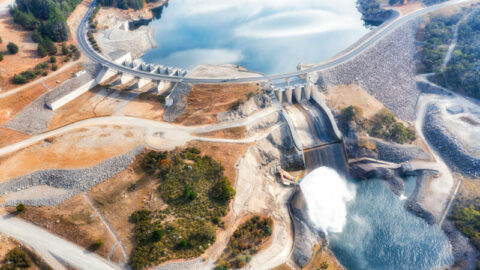The Alice Springs Future Grid project has partnered with Charles Darwin University (CDU) to test the capacity of solar inverters to provide support services to the electricity grid.
Testing will be undertaken at CDU’s Renewable Energy Microgrid Hub for Applied Research and Training (REMHART) in Darwin.
The Alice Springs Future Grid is a whole-of-system, multi-stakeholder project considering how Alice Springs can achieve 50 per cent renewable energy by 2030.
The primary technology tested will be three residential inverters – the devices that convert energy generated from solar panels and batteries into electricity suitable for use in the grid.
CDU’s investigations will include testing the ability of the inverters to respond to changes in frequency in the network and determining if the devices can provide a reliable response, which could be used in Essential System Services (ESS).
In a real-world application, this means renewable energy technologies could be used to prevent power cuts or other interruptions to electricity supply.
Future Grid Project Director, Lyndon Frearson, from Alice Springs engineering firm Ekistica, said CDU’s ability to facilitate this testing underscored how new opportunities, trials and partnerships can be developed in the Northern Territory.
“The experts at CDU’s REMHART facility have been working alongside the Alice Springs Future Grid project since its inception,” Mr Frearson said.
“One of the great opportunities we have in the Northern Territory is the variety of organisations that have an interest in the energy sector and in working together to achieve the 50 per cent by 2030 renewable energy target.
“Through these partnerships, we are able to bring an incredible range of skilled and dedicated people along with us, on this journey.”
Individual solar, hybrid and battery inverters have now been installed and will be tested for ESS response characteristics including delay time, ramp time and maximum charge/discharge power outputs under different load and generation scenarios.
Findings will assist in measuring how residential inverters can provide services to the grid.
Director of the Energy and Resources Institute at CDU, Suresh Thennadil, said it was exciting to work with Future Grid given the significant impact it will have on working towards the Northern Territory’s renewable energy goals.
“This is a great opportunity for our researchers to apply their skills to challenges relevant to industry and our communities, while at the same time developing their connections with Future Grid partner organisations,” Mr Thennadil said.
“The REMHART facility at CDU is an industry-focused innovation and training hub. The inverter testing via the Future Grid project will demonstrate REMHART’s ability to bring together industry and academic researchers.”
Mr Thennadil said he expects the results from this study to inform the direction of future research.
“In the coming years, not decades, we will need a revolution in power generation and distribution that has not been seen since the initial rollout of a national power grid.
“The testing facility is a vital tool in making this power revolution happen in the Northern Territory, with research and testing of new renewable systems, and training provided to build industry capacity.”
Delivery of the Alice Springs Future Grid project is coordinated by the Intyalheme Centre for Future Energy, on behalf of Desert Knowledge Australia (DKA).
Future Grid is supported by the Australian Renewable Energy Agency (ARENA), the Federal Government and the Northern Territory Government.
Findings from the various activities of Future Grid, including the testing carried out by CDU, will be considered for inclusion in the Alice Springs Roadmap to 2030 report – anticipated for publication in 2023.
















